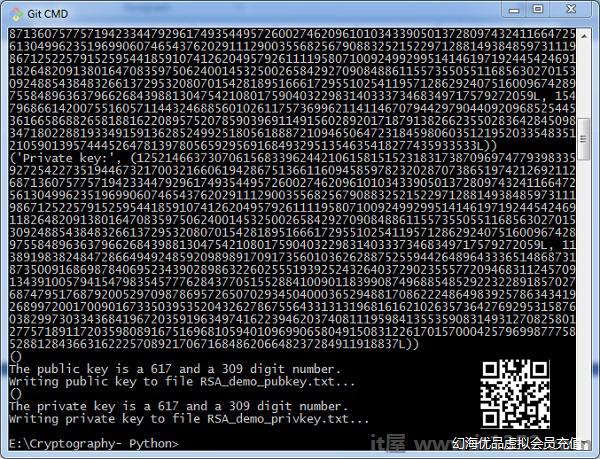在本章中,我们将重点介绍使用Python逐步实现RSA算法.
生成RSA密钥
涉及以下步骤生成RSA密钥 :
创建两个大的素数,即 p 和 q 的.这些数字的乘积称为 n ,其中 n = p * q
生成一个(p-1)和(q-1)相对素数的随机数.将数字称为 e .
计算e的模数逆.计算出的倒数将被称为 d .
生成RSA密钥的算法
我们需要两个主要算法来使用Python和minus生成RSA密钥; Cryptomath模块和 Rabin Miller模块.
Cryptomath模块
cryptomath的源代码遵循RSA算法的所有基本实现的模块如下<
def gcd(a, b): while a != 0: a, b = b % a, a return bdef findModInverse(a, m): if gcd(a, m) != 1: return None u1, u2, u3 = 1, 0, a v1, v2, v3 = 0, 1, m while v3 != 0: q = u3 // v3 v1, v2, v3, u1, u2, u3 = (u1 - q * v1), (u2 - q * v2), (u3 - q * v3), v1, v2, v3 return u1 % m
RabinMiller模块
源代码遵循RSA算法的所有基本实现的RabinMiller模块如下<
import randomdef rabinMiller(num): s = num - 1 t = 0 while s % 2 == 0: s = s // 2 t += 1 for trials in range(5): a = random.randrange(2, num - 1) v = pow(a, s, num) if v != 1: i = 0 while v != (num - 1): if i == t - 1: return False else: i = i + 1 v = (v ** 2) % num return Truedef isPrime(num): if (num 7< 2): return False lowPrimes = [2, 3, 5, 7, 11, 13, 17, 19, 23, 29, 31, 37, 41, 43, 47, 53, 59, 61, 67, 71, 73, 79, 83, 89, 97, 101, 103, 107, 109, 113, 127, 131, 137, 139, 149, 151, 157, 163, 167, 173, 179, 181, 191, 193, 197, 199, 211, 223, 227, 229, 233, 239, 241, 251, 257, 263, 269, 271, 277, 281, 283, 293, 307, 311, 313,317, 331, 337, 347, 349, 353, 359, 367, 373, 379, 383, 389, 397, 401, 409, 419, 421, 431, 433, 439, 443, 449, 457, 461, 463, 467, 479, 487, 491, 499, 503, 509, 521, 523, 541, 547, 557, 563, 569, 571, 577, 587, 593, 599, 601, 607, 613, 617, 619, 631, 641, 643, 647, 653, 659, 661, 673, 677, 683, 691, 701, 709, 719, 727, 733, 739, 743, 751, 757, 761, 769, 773, 787, 797, 809, 811, 821, 823, 827, 829, 839, 853, 857, 859, 863, 877, 881, 883, 887, 907, 911, 919, 929, 937, 941, 947, 953, 967, 971, 977, 983, 991, 997] if num in lowPrimes: return True for prime in lowPrimes: if (num % prime == 0): return False return rabinMiller(num)def generateLargePrime(keysize = 1024): while True: num = random.randrange(2**(keysize-1), 2**(keysize)) if isPrime(num): return num
生成RSA密钥的完整代码如下:<
import random, sys, os, rabinMiller, cryptomathdef main(): makeKeyFiles('RSA_demo', 1024)def generateKey(keySize): # Step 1: Create two prime numbers, p and q. Calculate n = p * q. print('Generating p prime...') p = rabinMiller.generateLargePrime(keySize) print('Generating q prime...') q = rabinMiller.generateLargePrime(keySize) n = p * q # Step 2: Create a number e that is relatively prime to (p-1)*(q-1). print('Generating e that is relatively prime to (p-1)*(q-1)...') while True: e = random.randrange(2 ** (keySize - 1), 2 ** (keySize)) if cryptomath.gcd(e, (p - 1) * (q - 1)) == 1: break # Step 3: Calculate d, the mod inverse of e. print('Calculating d that is mod inverse of e...') d = cryptomath.findModInverse(e, (p - 1) * (q - 1)) publicKey = (n, e) privateKey = (n, d) print('Public key:', publicKey) print('Private key:', privateKey) return (publicKey, privateKey)def makeKeyFiles(name, keySize): # Creates two files 'x_pubkey.txt' and 'x_privkey.txt' (where x is the value in name) with the the n,e and d,e integers written in them, # delimited by a comma. if os.path.exists('%s_pubkey.txt' % (name)) or os.path.exists('%s_privkey.txt' % (name)): sys.exit('WARNING: The file %s_pubkey.txt or %s_privkey.txt already exists! Use a different name or delete these files and re-run this program.' % (name, name)) publicKey, privateKey = generateKey(keySize) print() print('The public key is a %s and a %s digit number.' % (len(str(publicKey[0])), len(str(publicKey[1])))) print('Writing public key to file %s_pubkey.txt...' % (name)) fo = open('%s_pubkey.txt' % (name), 'w')fo.write('%s,%s,%s' % (keySize, publicKey[0], publicKey[1])) fo.close() print() print('The private key is a %s and a %s digit number.' % (len(str(publicKey[0])), len(str(publicKey[1])))) print('Writing private key to file %s_privkey.txt...' % (name)) fo = open('%s_privkey.txt' % (name), 'w') fo.write('%s,%s,%s' % (keySize, privateKey[0], privateKey[1])) fo.close()# If makeRsaKeys.py is run (instead of imported as a module) call# the main() function.if __name__ == '__main__': main()输出
生成公钥和私钥并将其保存在相应的文件中,如以下输出所示.
